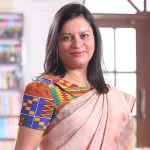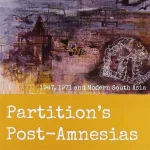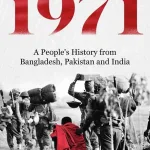
As India and Pakistan mark 76 years of independence from British rule and simultaneous Partition, a look at the intertwined stories and work of three young women oral historians from the region
By Sara Arshad
Well into her PhD studies on the medieval history of English literature at Cambridge University, Ananya Jahanara Kabir began wondering what exactly she was doing with her life. Then in 1997, the 50th year of the partition of India and Pakistan nudged her into an area she hadn’t considered before: her own history and inheritance.
She remembers the late 1990s as a time of great freedom of speech, when people were expressing their emotions and stories, and holding great discussions into history.
Kabir’s family exemplifies the kind of fluid identity that was once the norm. Her father’s family lived in Delhi, while her aunt’s family lived in Dhaka. They had more family members in Pakistan, and there were frequent cross-border visits to each other.
Inspired by her cross-border family linkages and their stories, Kabir, currently a professor of English Literature at King’s College London, decided to study those connections and share them with the world. This led to her book Partition’s Post-Amnesias: 1947, 1971 and Modern South Asia (Women Unlimited, 2013).
Listening to her story at an online discussion reminded me of my own relatives who lived in Firozpur, India, at the time of Partition. The family ended up being partitioned themselves – a brother in Dhaka, another in Karachi, and a sister in Delhi. They were first divided in 1947, when the sister stayed behind in India with her husband and his family who refused to leave their home and belongings.
The brothers and uncles, with their successful electronics business, settled in Pakistan. In 1971, the elder brother who had set up shop in East Pakistan stayed on in independent Bangladesh, while his younger brother continued to live in Karachi, Pakistan.
Restrictive visa policies prevented the families from meeting one another for decades, including in 2004 when their father passed on without being able to see his children one last time. The pain lingers on, and the next generation is no stranger to the difficulties and lengthy visa procedures when their parents try to meet.
Oral historian and writer from the Subcontinent, Anam Zakaria, also took inspiration from her own family history for her research. She grew up in the 1990s on the Pakistani side of Punjab hearing stories of Partition, particularly from her grandmother. A large number of ‘two-nation making’ stories, as she puts it, were always present around her.
Following up on this recurring theme in her family’s stories, she set out to study this subject and spent time with Partition survivors. Their narratives do not figure in most history books, so those who only read what’s in these books end up knowing very little, she says.
Her first book, The Footprints of Partition: Narratives of Four Generations of Pakistanis and Indians (2015) was followed by Between the Great Divide: A Journey into Pakistan-Administered Kashmir (2018). Then came 1971: A People’s History from Bangladesh, Pakistan and India (2019). She conducted her own research, including interviews and museum visits, to write these books.
Also growing up in the 1990s across the border in Delhi was Aanchal Malhotra, another oral historian but one who originally wanted to be an artist. “Language crawled into my work very slowly and sort of swallowed the visual image until it almost became an image,” she says evocatively.
In 2017, she co-founded the Museum of Material Memory, a digital repository of cultural objects that links art and Partition. Her book followed: Remnants of a Separation: A History of the Partition Through Material Memory (Harper Collins India, 2017), which was retitled Remnants of Partition: 21 Objects from a Continent Divided (Hurst 2019) in international editions.
I had heard the three writers share their stories at an online discussion last winter titled ‘Beyond Partitions: Shared Histories, Ways Forward’, curated by Sapan, the Southasia Peace Action Network.
People across Southasia view the Partition of British India differently, noted discussion moderator Priyanka Singh, an analytics consultant from Delhi. The narrative in India sees 1947 as the country’s Partition. In Pakistan, this is seen as the year the country was born. For Bangladesh, 1971 is the year of liberation, but for those in Pakistan, it is the year their country was partitioned.
Children are taught about the hatred and rivalry between the two religions, while stories of shared brotherhood rarely make it to the mainstream.

Many ignore Partition, says Aanchal Malhotra, because the stories are full of conflict and hostility. “I was never interested in knowing what really happened,” she says, adding that there are “a lot of people like me who kind of ignore Partition; you never confront it on a day-to-day basis.”
The never-ending downward spiral of hatred continues, compounded by harsh visa policies. People are allowed to meet blood relatives only after much effort and years of waiting. The pain of a loved one’s death across the border is compounded by the inability to see them one last time.
The nation states of Pakistan, India and Bangladesh categorise their citizens by nationality alone, with no room for emotion or relationship. People are separated from each other through violent narratives and intractable borders.
The groundbreaking work The Other Side of Silence: Voices from the Partition of India by Urvashi Butalia (Duke University Press Books, 1998) foregrounds the voices of women. Based in Delhi, Butalia heads the publishing house Zubaan Books that she launched in 2003. She had earlier co-founded Kali for Women, the first Indian publishing house dedicated to publishing for women.
In her concluding remarks at the Sapan webinar, Butalia talked about the importance of spotlighting conversations about history that are often difficult to talk about, including how someone feels while pursuing those histories, and their own emotional entanglement with the subject. But without this engagement, the younger generation will never learn about themselves and “others”.
“The fact that many of you can so easily be world citizens enables connections of the kind that were really, really difficult for people like us,” she said to the younger members of the audience. See her article, ‘Dialogue and relationship-building needed to heal the wounds of Partition and build peace in the region’, Sapan News.
Countless stories die with people, shared histories that the world will never know. But times are changing and people are coming forward to share their stories and to have these difficult conversations. Perhaps one day, these histories will dissolve the boundaries that have scarred our present and future.
Sara Arshad is a teacher and poet in Lahore, Pakistan
Note: The above piece was originally published by the Sapan News Network on August 12, 2023.




